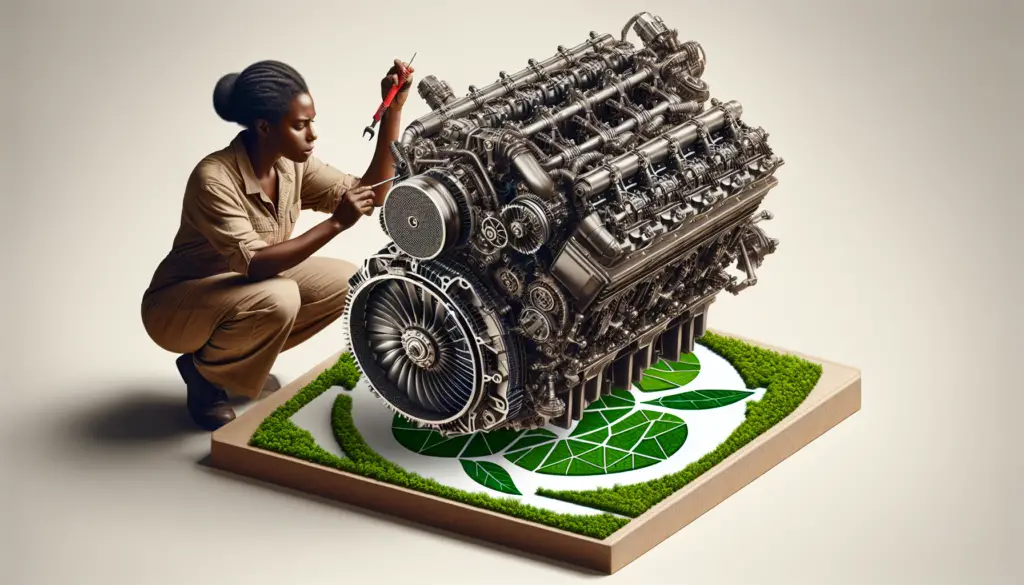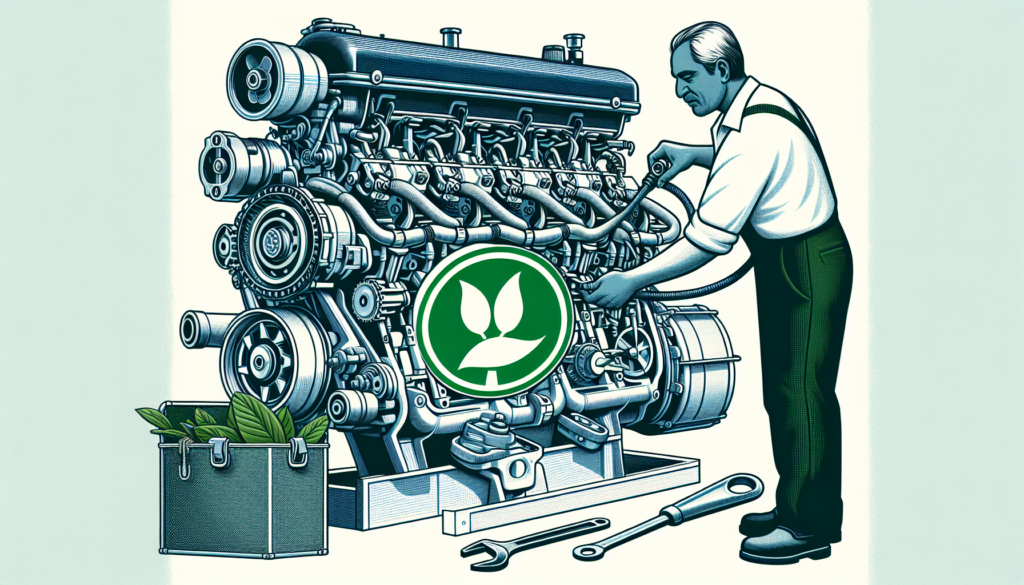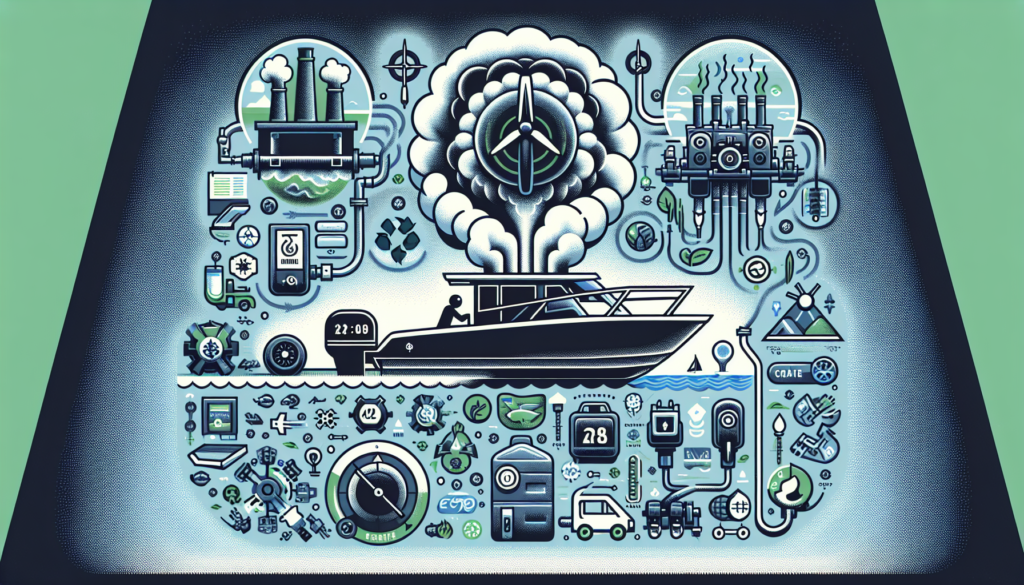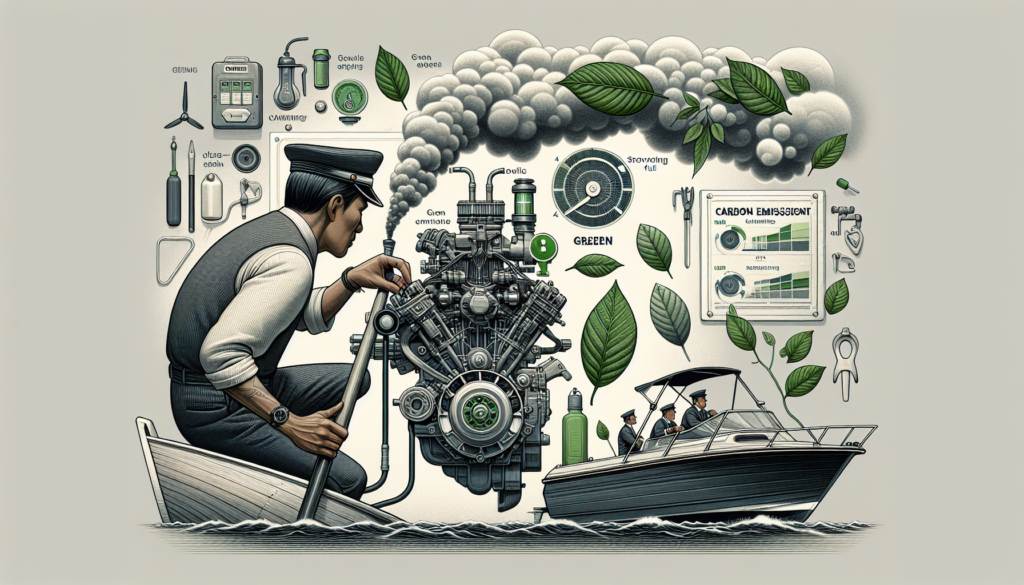Tackling climate change requires us to scrutinize all potential sources of greenhouse gases, including what you might initially overlook, like boat engines. If you are an avid boater or work in the industry, knowing how to reduce boat engine carbon emissions can be a game-changer. This article sheds light on effective strategies to achieve this, helping you make your contribution to preserving the environment even while enjoying or working on the water.

Understanding Boat Engine Emissions
Defining carbon emissions from boat engines
When you think about pollution, boat engine emissions might not be the first thing that comes to mind. By definition, carbon emissions from boat engines are the harmful gases released into the environment as your boat burns fuel. These gases, such as carbon dioxide and nitrogen oxides, contribute to global warming and air pollution.
The environmental impact of boat engine emissions
Boat engine emissions play a significant role in environmental degradation. These emissions contribute to the greenhouse effect that leads to global warming. They also lead to poor air quality, acidification of oceans, and a loss of biodiversity. It’s crucial to understand that small amounts of these emissions can add up quickly, especially in concentrated areas like marinas, leading to detrimental environmental effects.
Sources of emissions from boat engines
Several factors contribute to the emissions from boat engines. The type of engine used, the fuel type, and the boat’s load significantly impact the quantity and type of emissions. Older engines and those in poor maintenance conditions often emit more pollutants. Ordinary operational activities like idling at the dock or moving at full speed also contribute to increased emissions.
Current Standards for Boat Engine Emissions
Existing emission standards and regulations
There are various emission standards and regulations implemented to control the amount of pollutants released from boat engines. Some of these standards focus on reducing carbon dioxide, nitrogen oxides, and particulate matter from the exhaust. The standards apply depending on the engine size, the type of boat, and its intended use.
Role of global and national regulatory bodies
Global and national regulatory bodies play a crucial role in enforcing these emission standards and regulations. Bodies like the International Maritime Organization and Environmental Protection Agencies set and regulate these standards. They design these measures to not only control emissions but also encourage continuous advancement of pollution control technology in the boating industry.
Implications of noncompliance
Noncompliance with boat engine emission standards and regulations can lead to substantial penalties. These can range from fines to restrictions on boat usage. Enforcing these penalties helps hold boat owners accountable and encourages industry-wide efforts to protect the environment.

Improving Fuel Efficiency to Reduce Emissions
Tips for better fuel efficiency
Improving your boat’s fuel efficiency is a cost-effective approach to reducing emissions. Some ways to achieve better fuel efficiency include keeping the hull clean for smoother movement in water, keeping the engine well-tuned, and avoiding unnecessary idling.
Effects of load and speed on fuel efficiency
The load you’re carrying and your boat’s speed can significantly affect fuel efficiency. Excessive speed and load can push the engine to work harder, consuming more fuel and releasing more emissions. Being mindful of your boat’s load and speed can ensure optimized fuel usage.
Selecting the right fuel for your boat
Using the right fuel for your boat can also reduce emissions. Premium fuels may burn cleaner and produce fewer pollutants. Although they might be more expensive, the environmental benefits may outweigh the costs in the long run.
Switching to Cleaner Fuels
Different types of cleaner fuels
Switching to cleaner fuels is another strategy to reduce boat engine emissions. Biofuel, diesel with lower sulfur content, and liquefied natural gas are some alternatives to conventional fuels that produce less pollution.
Benefits of using biofuels
Biofuels are often a more environmentally friendly option. They are made from renewable resources and produce fewer greenhouse gases compared to fossil fuels. Biofuels also have the advantages of being biodegradable and non-toxic.
Availability and cost-effectiveness of cleaner fuels
Availability and cost-effectiveness of cleaner fuels vary widely depending on the location and market dynamics. While in some regions, these fuels might be readily available and competitively priced; in others, they may be expensive or hard to find. Careful evaluation of the local fuel market is essential before making a decision.

Leveraging Hybrid Technology
The principles of hybrid boat engines
Hybrid boat engines combine two or more types of power sources, such as an internal combustion engine and an electric motor. They generate power in a way that reduces fuel consumption and emissions. When idling or moving at low speeds, these engines can switch to the electric motor, reducing fuel usage.
Environmental benefits of hybrid engines
The primary benefit of hybrid boat engines is their ability to reduce emissions significantly. Since these engines often operate on electric power at lower speeds, they emit fewer pollutants. Additionally, the use of regenerative braking technology helps to save energy and reduce overall fuel consumption.
Comparative cost and performance of hybrid engines
While hybrid engines can be more expensive upfront, the long-term cost savings exist through reduced fuel consumption. In terms of performance, hybrid engines are often quieter and smoother compared to traditional boat engines, making them a more comfortable choice for boaters.
Investing in Electric Boat Engines
Advantages of electric engines
Electric boat engines are a highly sustainable solution. They produce zero tailpipe emissions, leading to cleaner air and waterways. Electric engines are also quieter, reducing noise pollution. Additionally, they require less maintenance, which can lead to further long-term cost savings.
Considerations when upgrading to electric
When contemplating an upgrade to an electric boat engine, consider factors like the battery range, charging infrastructure, and the initial financial investment. The wide availability of charging points is as critical as sufficient battery life to prevent interruptions during your boating journey.
Innovation and growth of the electric boat market
The electric boat market is expanding rapidly, thanks to continuous innovations and increased awareness of environmental issues. The industry’s growth provides boaters with a variety of electric engine options to suit different boat sizes and purposes. The constant advancements make electric engines an increasingly appealing investment.

Regular Maintenance and Servicing of Boat Engines
Importance of regular engine maintenance
Regular maintenance of your boat engine is key to reducing emissions. Properly maintained engines run more efficiently, use less fuel, and produce fewer pollutants. Regular engine checks can also help identify and fix problems that may lead to higher emissions.
Maintenance tips for better fuel economy
Keep your engine well-tuned by changing the oil regularly, replacing spark plugs as needed, and ensuring the air filter is clean. Avoid overfilling your fuel tank as it can lead to fuel wastage. Regularly clean the propellers and hull of your boat to minimize resistance in water and improve fuel economy.
Role of professional servicing in emission reduction
Professional servicing can play a vital role in maintaining your engine’s health and reducing emissions. Qualified professionals can thoroughly identify and address mechanical issues that affect fuel efficiency. They can also advise on emission reduction strategies specifically suited to your boat.
Education and Training for Boaters
Benefits of emission reduction training
Boat owners and operators can gain significant benefits from emission reduction training. Through such programs, you can learn about efficient boat operation, proper maintenance practices, and the latest emission reduction technologies. This knowledge can empower you to make more environmentally-friendly choices.
Key components of training programs
Typically, emission reduction training programs include modules on boating laws and regulations, fuel-efficient boating practices, and engine maintenance. Some programs may also cover renewable and alternative energy sources for boats. The ultimate goal is to increase awareness and promote sustainable practices within the boating community.
Availability of educational resources for boaters
There is a wealth of educational resources available for boaters interested in reducing emissions. Many maritime organizations offer guides, online courses, and workshops on sustainable boating. Participating in these programs and staying informed can help you make a positive environmental impact.
Employing Renewable Energy Sources on Boats
Utilizing solar power for boat engines
One way of reducing boat engine emissions is by utilizing solar power. Solar panels fitted on boats can generate electricity to run the boat’s engine and other systems. Although solar power may not be suitable for all boat types or uses, it can be a highly effective solution for reducing emissions on suitable vessels.
Wind energy as an alternative power source
Wind energy, one of the oldest methods of propelling boats, can also play a significant role in reducing emissions. Modern technology has made it possible to use wind power efficiently, even aboard motorized boats. Wind turbines installed on boats can generate electricity, reducing dependency on traditional fuel-powered engines.
Advancements and potential of renewable energy in boating
There have been significant advancements in the use of renewable energy sources in boating. From increasingly efficient solar panels and wind turbines to innovations in kinetic energy and hydrogen fuel cells, the potential to further reduce emissions through renewable energy is high.
Adopting Sustainable Boating Practices
Efficient driving techniques for emission reduction
Adopting efficient driving techniques can help reduce your boat’s emissions. Consider maintaining a consistent speed, as sudden speeding up or slowing down can lead to increased fuel consumption. Starting and stopping the engine gently can also save fuel, reducing the volume of pollutants released.
Responsible disposal of boat waste
Proper disposal of boat waste is crucial to sustainable boating. Wastewater, litter, or spills should never be discarded overboard. Instead, use the appropriate disposal facilities at the marina. Adopting such responsible actions can protect marine environments from pollution.
Promoting sustainable boating within the community
Everyone has a role to play in promoting sustainable boating within their community. Sharing knowledge about emission reduction, encouraging fellow boaters to adopt sustainable practices, and supporting regulations aimed at protecting the environment can contribute to cleaner waterways and healthier ecosystems. Together, we can ensure a sustainable future for the boating community.


[…] electric outboard motors don’t emit harmful greenhouse gases like carbon dioxide, which means they’re playing a pivot role in reducing air pollution. By using these motors, you’re doing your part to fight climate change while enjoying your boating experience. […]